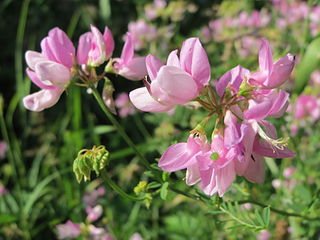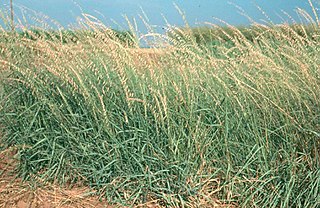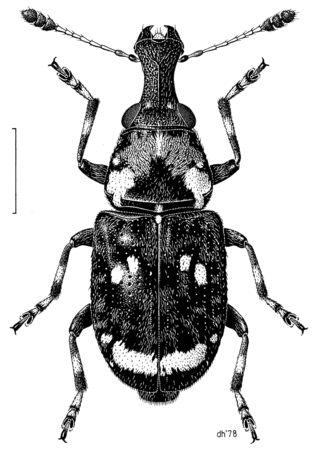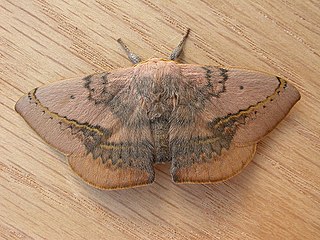
The barred owl, also known as the northern barred owl, striped owl or, more informally, hoot owl or eight-hooter owl, is a North American large species of owl. A member of the true owl family, Strigidae, they belong to the genus Strix, which is also the origin of the family's name under Linnaean taxonomy. Barred owls are largely native to eastern North America, but have expanded their range to the west coast of North America where they are considered invasive. Mature forests are their preferred habitat, but they can also acclimatise to various gradients of open woodlands. Their diet consists mainly of small mammals, but this species is an opportunistic predator and is known to prey upon other small vertebrates such as birds, reptiles, and amphibians, as well as a variety of invertebrates.

The black-and-white warbler is a species of New World warbler, and the only member of its genus, Mniotilta. It breeds in northern and eastern North America and winters in Florida, Central America, and the West Indies down to Peru. This species is a very rare vagrant to western Europe.

Securigera varia, commonly known as crownvetch or purple crown vetch, is a low-growing legume vine. It is native to Africa, Asia and Europe and is commonly used throughout the United States and Canada for erosion control, roadside planting and soil rehabilitation. It has become an invasive species in many states of the US.

Bouteloua is a genus of plants in the grass family Poaceae. Members of the genus are commonly known as grama grass.

The genus Securigera contains a number of plant species commonly referred to as crownvetch. It is a segregate of the genus Coronilla. The name Securigera was first published by A. P. de Candolle in 1805 with the single species Securigera coronilla, which is now considered to be a synonym of Securigera securidaca(L.) Degen & Dörfl. (1897), based on the earlier publication of the same taxon as Coronilla securidacaL. in 1753.

Anthribidae is a family of beetles also known as fungus weevils. The antennae are not elbowed, may occasionally be longer than the body and thread-like, and can be the longest of any members of Curculionoidea. As in the Nemonychidae, the labrum appears as a separate segment to the clypeus, and the maxillary palps are long and projecting.

Mimachlamys varia, also known under common names variegated scallop and black scallop, is a species of small scallop, a marine bivalve mollusk in the family Pectinidae, the scallops. It occurs in the North Sea, the English Channel, the eastern Atlantic Ocean, and the Mediterranean Sea.

Anthela varia, the variable anthelid, is a moth of the family Anthelidae. The species was first described by Francis Walker in 1855. It is found in the coastal areas of southern Western Australia, southern Queensland, New South Wales, and Victoria.

Holochroa is a monotypic moth genus in the family Geometridae. Its only species, Holochroa dissociarius, is found in North America. The species was described by George Duryea Hulst in 1887 and he described the genus nine years later in 1896.

Heterocampa is a genus of prominent moths in the family Notodontidae. There are about 18 described species in Heterocampa, found in North, Central, and South America.

Giovanni Innocenzo Martinelli OFM was an Italian Roman Catholic prelate. He was also a Vicar Apostolic of Tripoli and the Titular Bishop of Tabuda.
Meganola varia is a species of moth in the family Nolidae and superfamily Noctuoidea.

Therevinae is a subfamily of stiletto flies in the family Therevidae. More than 20 genera and 470 described species are placed in the Therevinae.
Tabuda is a genus of stiletto flies in the family Therevidae, with about seven described species.

Agrypnia is a genus of giant caddisflies in the family Phryganeidae. There are about 19 described species in Agrypnia.

Heterocampa varia, the sandplain heterocampa, is a species of moth in the family Notodontidae. Other common names include the alpine mouse-ear and white-marked heterocampa. It was first described by Francis Walker in 1855 and it is found in North America.

Leucochrysini is a tribe of green lacewings in the family Chrysopidae. There are 7 genera and 213 described species in Leucochrysini.

Senopterina is a genus of signal flies. There are about 17 described species in Senopterina.
Senopterina varia is a species of signal flies.
Leia varia is a species of fungus gnats in the family Mycetophilidae.















